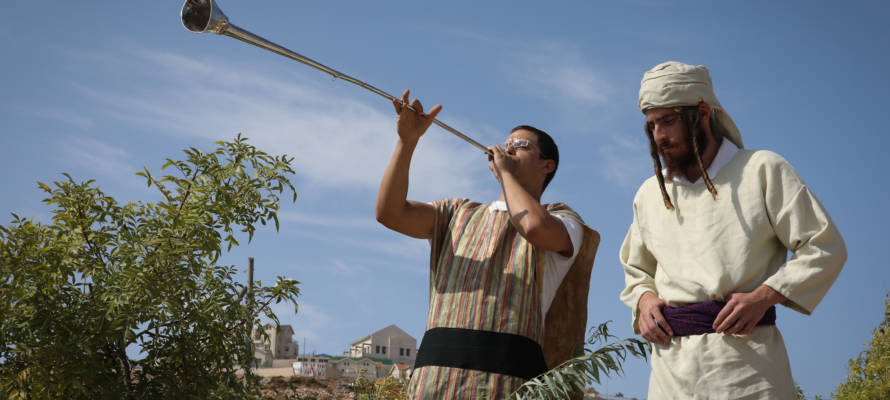What significance could ancient rituals, such as the Passover sacrifice, have in our modern era?
By Rabbi Ari Enkin, Rabbinic Director, United with Israel
This week’s Torah portion is “Bo” (Exodus 10:1-13:16), and in it we read about the famous Passover Sacrifice (also known as the “Paschal lamb,” or the “Passover lamb”), which is (was) the central feature of any Passover Seder. As we will see, there is much more symbolism to the Passover Sacrifice than meets the eye. Let’s take a look at the relevant passage:
“And God spoke to Moses and Aaron in the land of Egypt, saying, ‘Speak to the entire assembly of Israel and say to them: On the 10th of this month [the month of Nissan] they shall take for themselves — each man — a lamb for each household. But if the household will be too small for an entire lamb, then he and his neighbor who is near his home shall group together and take according to the number of people…you must be registered for the lamb. A perfect lamb, a male, within its first year…for you: from the sheep or from the goats… You shall keep it safe until the 14th day of this month.’”
As we can see, the Passover lamb had to be either a lamb or a goat, male, one year old, and without blemish. No other animal was acceptable. So too, only Jews were allowed to partake of the sacrifice to further emphasize the national aspect of the holiday and the Exodus of the Jews from Egypt. The animal was slaughtered on the afternoon before Passover begins and eaten that night, the start of Passover, as part of the Seder.
It is noted that the sheep was one of the many gods that the Egyptians worshipped. By commanding the Jews to publicly round up the sheep and slaughter them, not to mention to put this “god’s” blood on their doorpost, God was sending a message to the Egyptian people. He was telling them loud and clear to drop their worship of many “gods.” There is only one God!
So too, with the Jews carrying all this out in public as they did teaches us that we should always be proud to be Jewish in public even if it means going against the grain.
Let’s look at the steps leading up to and surrounding the performance of the Passover sacrifice. For starters, the Jews were meant to eat the Passover sacrifice as a family – “each household.” If the family was too small to consume an entire lamb, they were to join up with other family(ies) to ensure that there were enough people to consume an entire lamb. Every person had to eat at least an olive-sized piece of the lamb and they had to ensure that there was no meat left over.
We see from here an important lesson: Family comes first. Family and the home (not the synagogue!) are the pillars of Jewish life and the assurances of Jewish continuity. Ideally, the family was supposed to make Passover on their own. A strong Jewish family means strong Jewish descendants.
Importance of Community
However, as noted, most families aren’t large enough to be able to consume an entire lamb at a meal. As such, we turn to value number two in Judaism: society and community. Even the best of families cannot live on an island unto themselves. A Jew needs other Jews in order to practise Judaism properly. A Jew needs community. Indeed, with fewer than 10 people – a “minyan” – we are not even allowed to hold a proper prayer service or read the Torah. Judaism’s success depends on the strength of the community. We must have good neighbors and be good neighbors, supporting each other in our observance of Judaism.
Also notice how everyone must be “registered” on the lamb in which they will be partaking. This shows us how in Judaism you can’t hide. In Judaism, you need to stand up and be counted. You need to make a difference. Be proud to be a Jew. Be proud in your observance of mitzvot (Torah commandments).
It is interesting that there was only one Passover sacrifice throughout the 40 years that the Jews wandered in the desert. There was the sacrifice of that very first Passover night, the night of the Exodus, and then again a year later in the desert. There was no other Passover sacrifice for at least 39 years! Only after the Jewish people entered the land of Israel was the Passover sacrifice resumed. With the destruction of the Holy Temple in Jerusalem, the Passover sacrifice came to an end.
We hope and pray that very soon we will reinstate the Passover sacrifice with the arrival of the Messiah and the re-building of the third and final Temple.
Bring Joy to Israeli Soldiers - Send Winter Care Packages!
We are honored to thank the young men and women of the IDF who risk their lives every day to defend the citizens of Israel.
Join us in sending winter care packages and personal notes of support to Israeli soldiers who are out in the cold all day.
Warm up a soldier's heart with essential winter wear including fleece jackets, hats, gloves and more. Keep an entire unit warm!
THE SOLDIERS REALLY APPRECIATE YOUR LOVE AND CONCERN!
Click Here to Send Your Gift and Personal Note to Israeli Soldiers

